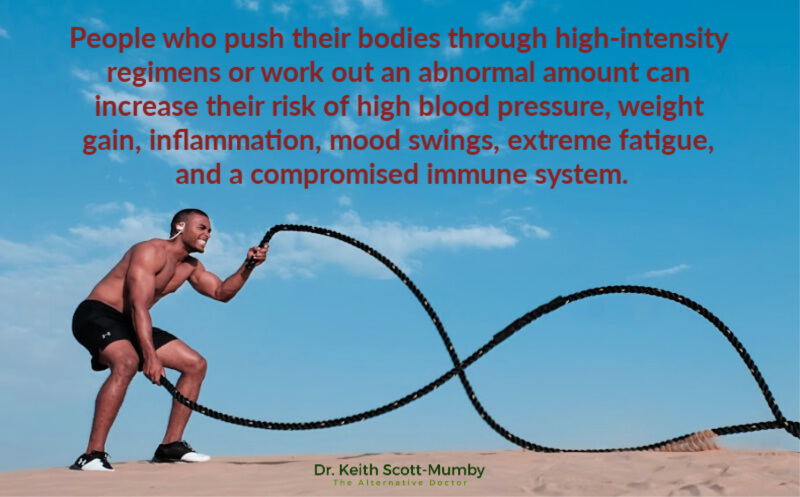How can it be possible to get too much exercise?
After all, the majority of the population doesn’t get enough healthy exercise. Coupled with the Western diet of high fat, high sugars, and chemical additives, the result is a drastic increase in your risk of obesity (particularly dangerous visceral fat around the midsection), heart disease, cancer, and diabetes…among others.
Exercise is a good thing, right?
Absolutely, it is. However, some people take working out to extremes. They push their bodies through high-intensity regimens or work out almost constantly. The result is an increase in your risk of high blood pressure, weight gain, inflammation, mood swings, extreme fatigue, and a compromised immune system.
In other words, like anything else, exercise is fantastic if done safely and within reason.
The Breakdown on the Breakdown
Each time you work out, your muscles develop tiny tears, oxidative damage occurs at the cellular level, and your heart is put under stress as your heart rate rises. This is normal and expected. As long as you allow your body to recover, these issues naturally (and efficiently) repair themselves.
However, if you push yourself through intense workouts day after day, your body never gets a break or an opportunity to recover.
Over time, this will not only influence your results, it will make those tiny tears, oxidative damage, and stress to your heart more pronounced. In fact, researchers use damage to thigh muscles from too much exercise as one way to predict early death.
You must evaluate why you exercise, determine your (healthy) personal goals, and accept that your body needs rest in order for you to meet those goals safely.
An Unusual Addiction (With A Positive Perception)
There’s a growing percentage of people who are crossing into addiction territory when it comes to exercise. Any activity – even a positive one – can turn into a negative one if taken too far. Exercise is no different.

8 Signs You Might Be Getting Too Much Exercise
- You aren’t seeing the results you once did.
- You hit a “plateau” in weight loss goals or experience unexpected weight gain.
- You experience feelings of guilt or self-loathing if you don’t exercise.
- You experience bouts of extreme fatigue and muscle soreness.
- You exercise while sick.
- You plan all areas of your life around a rigid workout schedule.
- You become sick more often or it seems harder to shake illness.
- You experience mood swings that may include depression, anxiety, or anger.
There’s no doubt that the societal demands for outer perfection are pretty tough. The pressure to push yourself beyond what your body can handle is intense.
There is a mentality of “if this much is good then this much more is better.” Just as with alcohol or medications, that logic is flawed and can leave your body wrecked.
Unless you’re a professional athlete or training for an extreme event – such as a marathon – working out intensely more than three times a week is likely hurting far more than it is helping.
It is imperative that you determine how much exercise is too much for you specifically. This can have many factors such as your age, current fitness level, and internal health.
Listen to your body!
Certified personal trainer and Harvard psychologist Holly Parker, PhD explains, “The benefits you want from working out – getting leaner, stronger, healthier – reverse when you don’t take breaks.” As for the psychological effects of working out, she adds, “Working out should enhance your life: friends, job, body, and mind.”
3 Tips for an Effective Exercise Regimen
- Give your body a chance to recuperate post-workout. This doesn’t mean you have to spend the day on the couch but consider touring an art museum, taking in an outdoor fair, or going for a casual walk with your dog or loved one. Let your cells recuperate at least three days a week and you’ll see the results in the gym and on your body.
- Know your personal goals – and make sure they’re realistic. You need to know why you’re working out to get the best results. Are there other aspects of your health that you can focus on – such as diet – that might give you quality results without pushing yourself so hard physically?
- Don’t forget that working out is only one aspect of your life. If you’ve been neglecting other areas (or people) in your life to hit the gym, try reconnecting with friends and family, reenergize your professional goals, and get back in touch with life outside solitary sweating.
There are no doubts about the benefits of exercise. It’s been proven time and time again in one scientific study after another. We all need regular workouts to avoid illness and disease. If you currently live a sedentary lifestyle, even low-impact workouts will make a big impact.
Make sure you don’t push yourself so hard that you cause injury – physically or emotionally. Working out is supposed to make you feel good, strong, and more energized.
If your workout doesn’t make you feel incredibly positive about yourself and your life – take a step back and decide if you might be exercising too much.
Then give your body a much-needed break! It will serve you better in the long run.
The post Is There Such A Thing As Too Much Exercise? appeared first on Dr. Keith Scott-Mumby.
